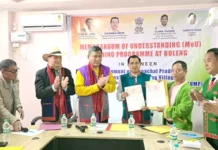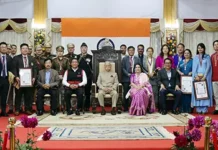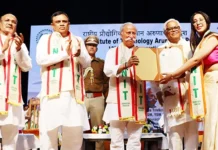[ Tongam Rina ]
Meet Joseph Laye, an enterprising and hard working young man, a rarity in the state where many young and not-so-young men bully and extort from government and business establishments to make a living, all in the name of society.
Joseph has three jobs. His early mornings are spent delivering newspapers across the capital to the hawkers and agencies between 4-8 AM. And he has a day job as a driver in a government office which starts at 9.30 AM.
In between hectic schedules, he manages a furniture shop that specializes in making coffins -one of the four places in Itanagar and Naharlagun.
Why a coffin shop?
It’s not only about making some money, but also helping families that struggle after a loved one passes on. Most of the time, we don’t know how to cope with grief but there are realities that one must accept and deal with, which includes making a coffin as we say our final good byes, he says.
Once inside the coffin, where do we bury our loved ones?
Many tribal families bury the dead within the compounds of their homes even when there are designated burial grounds, mostly community-owned land.
The designated burial grounds that are used are the ones marked for those who die an ‘unnatural death’- accidents or suicide. These grounds are mostly at the periphery of the villages. Loved, but not loved enough to be kept close.
Some bury them at the very site of accidents, unmindful of the fact that people grudge and perhaps curse at the unsightly memorial.
While it is a deeply personal choice and an emotive one, but does it really make sense to bury loved ones within the residential compounds?
Three generations down, most homes would have run out of space. And it would rather be an uncomfortable situation to dig up dead ancestors and having to rebury them.
Those who cremate the dead have it tougher, more so in places where cremation is not a tradition. Cremation sites are rare and few in the entire state.
On the other hand, urban areas in the Capital region do not have a cremation ground. The cremation ground has ended up as an election issue. Every five years, politicians promise one but even today, last rites are done in Laluk in Assam. Wonder how many have the money and resources to take the body all the way to Assam. The site at Karsingsa has ended up as garbage dumping ground, while the much-touted electric crematorium is yet to take off.
Those who have lost a loved one know the pain. Instead of grieving and spending precious moments before the last rites, many families spend time worrying where to perform the last rites.
Maybe, it is time we make it a little bit easier for those who do not have land or resources for the last rite.



